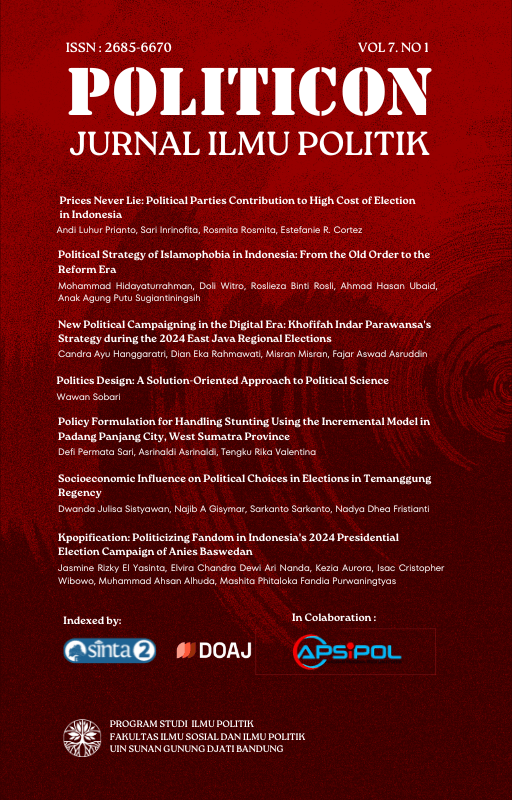Socioeconomic Influence on Political Choices in Elections in Temanggung Regency
DOI:
https://doi.org/10.15575/politicon.v7i1.37105Keywords:
Political Participation, Socio-Economic, Elections, Temanggung Regency, Education, Employment.Abstract
This study aims to analyze the influence of socio-economic factors on political participation in elections in Temanggung Regency. The research method employed is a quantitative combination of a survey involving 600 respondents from various districts in Temanggung Regency. The results reveal that factors such as education level, type of employment, and economic sector significantly impact community political participation. Higher education levels tend to enhance political awareness and engagement. Meanwhile, the type of employment and economic sectors influence patterns of political involvement. Economic issues such as unemployment and poverty present significant challenges faced by the people of Temanggung ahead of the elections. The recommendations of this study include increasing access to education, economic empowerment, and inclusive policies to encourage broader and more representative political participation.
References
A’yun, W. Q., & Faidati, N. F. (2021). Pemberdayaan Perempuan Rawan Sosial Ekonomi (Prse) Dalam Meningkatkan Kesejahteraan Keluarga di Kabupaten Bantul Tahun 2013-2018. Ijd-Demos, 3(1). https://doi.org/10.37950/ijd.v3i1.83
Abdullahi, A. M., Williamson, K., & Ahmed, M. Y. (2024). The impact of patriarchal culture on Somali women’s participation in politics. Development Policy Review, 42(2). https://doi.org/10.1111/dpr.12747
Adiputra, N. (2022). Coffee as Liberator Inclusive Social Policy for the Disabled People (Case Study: Enabled Baristas of Temanggung). Proceedings of the 4th International Conference on Economics, Business and Economic Education Science, ICE-BEES 2021, 27-28 July 2021, Semarang, Indonesia. https://doi.org/10.4108/eai.27-7-2021.2316914
Arniti, N. K. (2020). Partisipasi Politik Masyarakat Dalam Pemilihan Umum Legislatif Di Kota Denpasar. Jurnal Ilmiah Dinamika Sosial, 4(2), 329. https://doi.org/10.38043/jids.v4i2.2496
Azmi, H. N., Wijaya, H. B., & Basram, N. F. (2024). Study of Youth Participation in Development Based on Regional Spatial Profile: Case Study of Urban and Rural Villages in Temanggung, Indonesia. JAMBURA GEO EDUCATION JOURNAL, 5(1), 78–86. https://doi.org/10.37905/jgej.v5i1.24330
Berinsky, A. J., & Lenz, G. S. (2011). Education and Political Participation: Exploring the Causal Link. Political Behavior, 33(3), 357–373. https://doi.org/10.1007/s11109-010-9134-9
Christiaensen, L., Demery, L., & Kuhl, J. (2011). The (evolving) role of agriculture in poverty reduction—An empirical perspective. Journal of Development Economics, 96(2), 239–254. https://doi.org/10.1016/j.jdeveco.2010.10.006
Cicatiello, L., Ercolano, S., & Gaeta, G. L. (2015). Income distribution and political participation: a multilevel analysis. Empirica, 42(2), 447–479. https://doi.org/10.1007/s10663-015-9292-4
Dawes, C., Cesarini, D., Fowler, J. H., Johannesson, M., Magnusson, P. K. E., & Oskarsson, S. (2014). The Relationship between Genes, Psychological Traits, and Political Participation. American Journal of Political Science, 58(4), 888–903. https://doi.org/10.1111/ajps.12100
Downloads
Published
How to Cite
Issue
Section
Citation Check
License
Copyright (c) 2025 Dwanda Julisa Sistyawan

This work is licensed under a Creative Commons Attribution-ShareAlike 4.0 International License.
Authors who publish with this journal agree to the following terms:
- Authors retain copyright and grant the journal right of first publication with the work simultaneously licensed under a Creative Commons Attribution-ShareAlike 4.0 International License that allows others to share the work with an acknowledgment of the work's authorship and initial publication in this journal.
- Authors are able to enter into separate, additional contractual arrangements for the non-exclusive distribution of the journal's published version of the work (e.g., post it to an institutional repository or publish it in a book), with an acknowledgment of its initial publication in this journal.
- Authors are permitted and encouraged to post their work online (e.g., in institutional repositories or on their website) prior to and during the submission process, as it can lead to productive exchanges, as well as earlier and greater citation of published work (See The Effect of Open Access).




.jpg)




